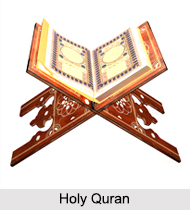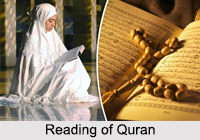 Holy Quran is the religious book of the Islamic community, and it is said to be the word of God. As God is alive and knows, He must have life, power, knowledge and speech. His speech is the word, the Quran. Quran is regarded as an uncreated, eternal world of Allah. Muslims try to learn the Holy Quran by heart and follow the teachings of their religion from it. The main message of Islam is to worship God and to treat all God`s creation with kindness and compassion.
Holy Quran is the religious book of the Islamic community, and it is said to be the word of God. As God is alive and knows, He must have life, power, knowledge and speech. His speech is the word, the Quran. Quran is regarded as an uncreated, eternal world of Allah. Muslims try to learn the Holy Quran by heart and follow the teachings of their religion from it. The main message of Islam is to worship God and to treat all God`s creation with kindness and compassion.
Etymology of the Holy Quran
The word Quran comes from a root, which means to `recite`. The literal meaning of Islam was revealed through angel Gabriel (on whom be peace) and was preserved in the Holy Quran. It is thus, a recital given by the Prophet Mohammad to his followers who wrote it.
Contents of the Holy Quran
The Quran contains the revelations given to the Holy Prophet of Islam, Prophet Muhammad.
It has 114 chapters and contains all the basic principles of the religion in the form of verses. These revelations were recorded and arranged in their present form by the orders of the 3rd Caliph Uthman in the 7th century. The word is revealed in the Arabic language and it is noted for its inimitable excellent language. The contents of the Holy Quran fall into two groups - those delivered at Mecca and those at Medina respectively.
 Quran is supplemented by another less important text called "Hadith". It contains sayings and teachings of Prophet Mohammad himself. It is also referred to as Sunna and contains the speech, dialogue and practice of the prophet.
Quran is supplemented by another less important text called "Hadith". It contains sayings and teachings of Prophet Mohammad himself. It is also referred to as Sunna and contains the speech, dialogue and practice of the prophet.
Reading of the Holy Quran
There are seven or ten different `readings` of the Quran. These are for the most part different ways of pronouncing the text, omission or assimilation of certain letters. The contents of the Quran were either divided into the obvious and the ambiguous. It was recognized that some passages were capable of more than one interpretation.
Teachings of the Holy Quran
The Quran is referred by the Muslims for all teachings about God, Angels, the Prophet, Resurrection, and the day of reckoning and the theory of heaven and hell. The Quran contains the final and definite revelation of God"s will for the guidance of man. It is the foundation of the whole Islamic structure.




















